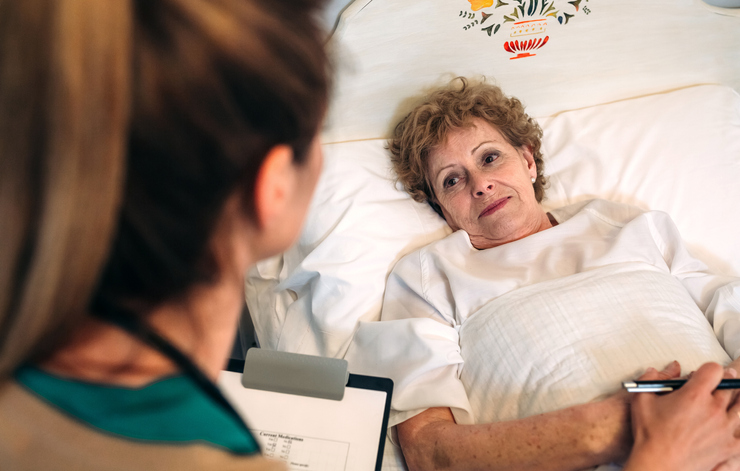In July 2020, the U.S. Food and Drug Administration (FDA) approved a new HIV treatment for seniors. Although the COVID-19 crisis overshadowed this exciting development, it’s still positive news for mature HIV and AIDS patients.
In particular, Rukobia (fostemsavir) is a new type of antiretroviral (ARV) drug approved for adults living with HIV. It largely benefits individuals who haven’t responded to other HIV medications. Generally, antiretroviral drugs prevent the HIV virus from replicating, thus stemming its proliferation in the body.
Jeff Murray, MD, deputy director of the Division of Antivirals at the FDA’s Center for Drug Evaluation and Research, said “This approval marks a new class of antiretroviral medications that may benefit patients who have run out of HIV treatment options.” He acknowledged how critical the development of new ARVs is for patients living with multi-drug-resistant HIV infections and those at greater risk for complications.
HIV Among Older Americans
While HIV/AIDS doesn’t receive the media attention it once did, thanks to widely available treatments, the Centers for Disease Control (CDC) says 37,000 new patients are diagnosed with the disease every year. Of this number, 17% are 50 years old or older.
- Put another way, more than 1.2 million Americans have HIV/AIDS.
- Approximately 400,000 of them are ages 55 and up
In 2018, we know that 11,425 senior patients succumbed to HIV complications in the United States. We should point out these deaths could be from any cause, ranging from HIV to car accidents and heart attacks. But, why can’t we pinpoint the exact number of seniors with HIV?
How Many Seniors Have HIV?
You’re likely already aware of high-risk behaviors associated with HIV, such as unprotected sex with infected partners, the sharing of contaminated drug paraphernalia, and blood transfusions from an infected source. The CDC says older Americans may visit the doctor, but they’re reluctant to discuss these issues in a physician’s office.
Similarly, healthcare professionals often shy away from broaching the topic of HIV infection. Thus, seniors may think their health problems or symptoms are simply age-related rather than related to an autoimmune deficiency.
There’s also a stigma involved with HIV. Older patients, in particular, want to avoid a diagnosis. They’re afraid of losing their social status or professional standing. Unquestionably, many fear the possibility of isolation, should friends and neighbors learn of their condition. The CDC has produced resources for combating HIV stigma and provided guidance for organizations interested in raising awareness of the issue.
Here at David York Home Health Care Agency, our team understands the unique concerns for seniors with HIV. We know antiretrovirals are the cornerstone of HIV/AIDS treatment, but our focus is on protecting seniors. Below, we reveal key facts about Rukobia for your consideration.
Rukobia (Fostemsavir)
Rukobia boasts a new (novel) mechanism of action and is the first-in-class HIV-1 attachment inhibitor. This unique oral treatment prevents HIV-1 from interacting with host immune cells by binding to the viral envelope protein gp120, leaving CD4+ T-cells untouched.
How it Works
According to the manufacturer’s website:
- Temsavir, the active moiety of Rukobia, attaches to gp120 on the surface of HIV-1 virions near the CD4 attachment site.
- The attachment of Temsavir locks gp120 into a closed formation.
- Essentially, it prevents the initial interaction between the virus and host immune cells and inhibits viral attachment and entry into CD4+ T-cells.
Some subjects achieved virologic suppression as soon as eight days after beginning the treatment. Up to 60% of trial subjects achieved virologic suppression by week 96. As with any new medicine, side effects continue to be studied.
Common Side Effects and Concerns
A few test subjects, less than 5%, said that they experienced nausea. Meanwhile, several complained of diarrhea, minor rashes, and headaches. However, 81% of the adverse reactions reported were mild or moderate in severity. The most common adverse events leading to the discontinuation of use were related to infections. In all, 3% of patients received the full treatment.
Ultimately, patients should consult with their physicians before trying new HIV treatments. Rukobia may or may not be the right treatment for you. To protect seniors, we’d like to encourage honest dialogue between them and their health care teams.
David York Agency Welcomes New HIV Treatments for Seniors in Pelham Parkway
If the above information about HIV treatments for seniors has been useful, check out David York Agency’s blog for more articles about senior care in Pelham Parkway.
David York Agency understands the challenges of caregiving and is willing to provide all the support you need.
If you’d like more information about David York Agency’s qualified, compassionate caregivers, contact us at 718.376.7755. A free phone consultation can help you decide what services might be best. If you’d like to hear more from us, please like us on Facebook or follow us on Twitter or LinkedIn.
David York Agency Home Healthcare remains committed to providing personalized care for your loved one. If you have questions about our services, please contact us. We can help you through the difficult times and give you the break you deserve!







